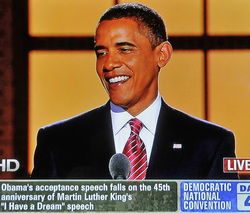| | That’s true on a local-government level, where elected leaders time and again show they prefer to enter secret sessions in order to spare themselves the embarrassment that comes with candor; or when they want to shut off access to public records to please one or another well-heeled donor. It’s especially true on the national level, where stakes are much higher. The unfolding scandals concerning IRS scrutiny of conservative groups, details over a terrorist attack in Benghazi, Libya and the Justice Department’s decision to grab a wide swath of telephone records from the Associated Press are stunning examples. In each case, the president has claimed a healthy distance from decisions made. But, as anyone with corporate or government experience can attest, tone and expectations are set at the top. If this were not the case, candidates wouldn’t campaign on promises to set the right tone. When first elected, President Barack Obama sent a memo to all federal agencies saying, “We will work together to ensure the public trust and establish a system of transparency, public participation, and collaboration.” The record shows his administration has done the opposite. Two months ago — a much more innocent, or perhaps blissfully ignorant, time — journalist and former Senate investigator Paul D. Thacker wrote a piece for slate.com, in which he wondered why the usual Washington watchdog groups had been so reluctant to criticize the Obama administration for doing much the same, or worse, than the Bush administration in terms of secrecy and manipulation. Three years ago, the Associated Press conducted a study that found 17 federal agencies were 50 percent more likely under the Obama administration to deny requests for information under the Freedom of Information Act than they were under Bush. Bush, as Thacker noted, was relentlessly criticized for trying to pressure scientists to alter facts or keep quiet, but Obama has done much the same, keeping cumbersome review and approval processes in place for federally funded scientists, with little criticism. Keeping in line with the confiscation of AP phone records, the Obama administration has done more to prosecute government leaks than all previous presidents combined. Leakers are, of course, sometimes difficult to distinguish from whistleblowers — federal workers who see things they believe are awry and have no other recourse than to discretely tell someone in the media. Thacker wrote that the time wasn’t yet ripe, for whatever reason, for this hypocrisy to generate outrage. But he said the “time will come when the cognitive dissonance between what Obama says and what he does will be too much.” Given the media outrage over grabbing two months worth of records from 20 AP phone lines in a fishing expedition to uncover the source of a leaked story about an anti-terrorism effort, that time may have arrived. For instance, the president’s decision this week to ask Sen. Chuck Shumer to reintroduce a bill to provide a federal reporter shield law had a certain ring of cognitive dissonance. It came across like an irritated grownup trying to shut up a screaming child with a piece of candy. As much as reporters would like such a thing, the reintroduced shield bill would come with the same watered-down language Obama insisted upon in an earlier version, which ultimately made it worth little. The dance between freedom and security has gone on a long time in this country. Bad people will always take advantage of freedoms and privileges to hurt people, but that shouldn’t devalue those freedomes. Even with the best intentions, those in power face pressures to safeguard the public with a heavy hand, but they face similar pressures to safeguard political power. A CNN/Time/ORC International Poll last month found 4 of 10 Americans would sacrifice some liberties to fight terrorism. They may wish to rethink that. |
|
0 Comments
Your comment will be posted after it is approved.
Leave a Reply. |
Search this siteLike what you read here? Please subscribe below, and we'll let you know when there is a new opinion.
The author
Jay Evensen is the Senior Editorial Columnist of the Deseret News. He has nearly 40 years experience as a reporter, editor and editorial writer in Oklahoma, New York City, Las Vegas and Salt Lake City. He also has been an adjunct journalism professor at Brigham Young and Weber State universities. Archives
November 2023
Categories
All
Links
|


 RSS Feed
RSS Feed

